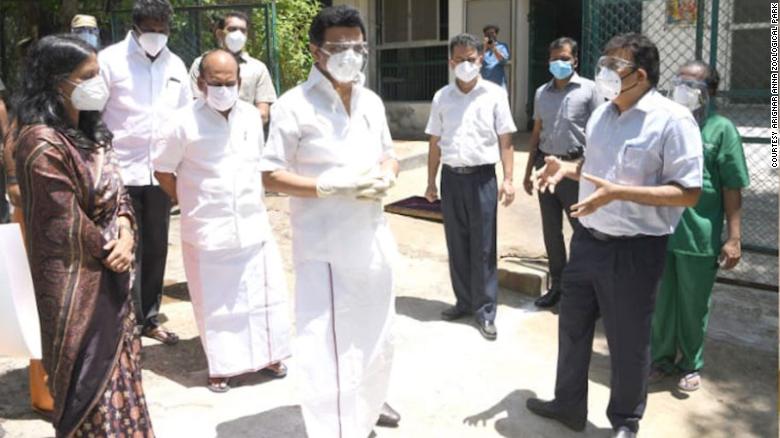Eight lions from India, infected with covid-19 0:37
New Delhi (CNN) -
The Indian government has ordered the temporary closure of all tiger reserves to tourism, following a series of COVID-19 outbreaks in zoos across the country.
The National Authority for the Conservation of the Tiger, a body under the Ministry of the Environment, issued its order on Monday after the death of a lioness who tested positive for COVID-19 a few days earlier.
"The most recent case of a zoo animal infected by covid-19 indicates once again the high probability of transmission of the disease from affected humans to captive wild animals," the order said.
"A similar transmission can also occur in tiger reserves."
Russia registers first vaccine against covid-19 for animals
To prevent tigers and other wildlife from becoming infected, all tiger reserves must close for tourist activities until further notice, the order said.
Tigers are an endangered species with fewer than 4,000 left on Earth, according to the World Wildlife Fund (WWF).
Several thousand tigers live in reserves in India, which has seen its population increase in recent years thanks to conservation efforts such as expanding forest cover and jail time for killing the animals.
The Arignar Anna Zoo began the process of quarantine and treatment of animals showing symptoms of covid-19.
The recent outbreak took place at the Arignar Anna Zoo, also known as Vandalur Zoo, in the southeastern city of Chennai, the Tamil Nadu state government reported in a press release.
Several Asian lions, an endangered species that only numbers hundreds of individuals, had shown symptoms of the disease at the zoo.
A symptomatic 9-year-old lioness named Neela died on Thursday.
It is not clear if Covid-19 was the direct cause of the animal's death.
advertising
Wild animals in danger from wastes related to covid-19
Zoo officials and a team of veterinarians immediately quarantined all the lions and began treating them with antibiotics.
They have taken samples from lions, tigers and other large mammals to send for analysis, in the hope that genetic sequencing could reveal which strain of the virus infected the lions.
Tamil Nadu Chief Minister MK Stalin visited the zoo on Sunday to discuss the situation with other wildlife ministers and authorities.
Stalin ordered officials to ensure that all zoo staff and animal keepers were vaccinated, and to "provide the best treatment for infected lions," according to the statement.
Tamil Nadu Chief Minister MK Stalin at the Arignar Anna Zoo in Chennai, India on June 6.
The outbreak comes after eight positive cases were found among lions in a Hyderabad zoo in March.
Similar outbreaks have also been recorded in zoo and safari lion enclosures in Jaipur and Etawah, according to the statement.
As a precautionary measure, Tamil Nadu closed its zoos to visitors on April 20.
Animals have also been infected in other parts of the world.
In New York, several tigers and lions from the Bronx Zoo tested positive for COVID-19 in April 2020 after showing symptoms such as coughing.
The animals are already recovered.
They investigate how some pets and animals in zoos were infected with covid-19 in New York
The news raised concerns among zoologists: After word of the Bronx Zoo infections spread, India's National Tiger Conservation Authority ordered all of the country's tiger reserves to watch their tigers for symptoms and to ensure that all animal handlers were COVID-free.
The recent covid-19 outbreaks come after the second wave of the virus in India, which began in mid-March and peaked in early May.
It killed tens of thousands of people, sickened millions and left the country reeling, as well as exposing animals to a higher risk of infection, according to Nikolaus Osterrieder, dean of veterinary medicine and life sciences at the City University of Hong Kong. .
"It is probably not a coincidence that in India, where there are a large number of cases, transmission to animals is a direct consequence," he said.
"The more cases that occur in humans, the greater the likelihood that animals, including zoo animals, will be infected."
Cats like lions and tigers are especially vulnerable to serious illness, he added.
Although animals such as minks and ferrets may be more susceptible to infection, they generally do not develop severe clinical symptoms, while the feline family, which includes domestic cats, 'can succumb to the disease, which can make them really sick.
Wildlife struggles to survive the pandemic 3:45
This poses a risk to endangered species such as Neela, the Asiatic lion.
Asiatic lions used to roam habitats from Africa to Greece, but are now only found in India, according to the International Union for Conservation of Nature's "Red List of Threatened Species."
According to the WWF, only 523 known specimens remain, and they face the widespread threat of poaching, habitat fragmentation and human activities such as nature tourism.
The outbreaks in zoos "show that humans can transmit pathogens to animals, and not just the other way around," Osterrieder said, pointing to human-introduced diseases that now threaten mountain gorilla species.
"We always have to be aware of it."
endangered animals india

